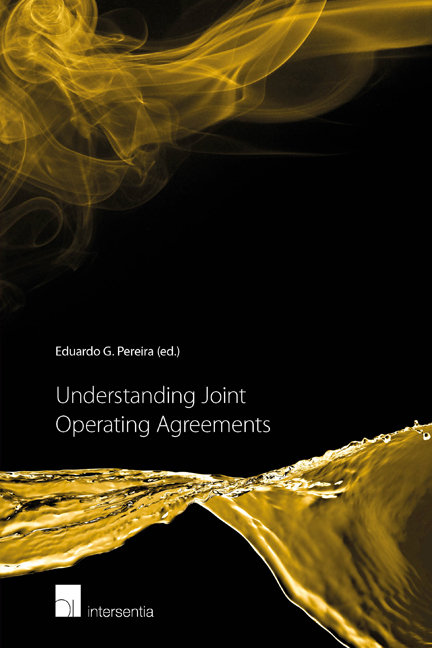Book contents
- Frontmatter
- Contents
- List of Abbreviations
- List of Authors
- Introduction
- PART I CONSIDERATIONS PRIOR TO ENTERING INTO A JOA
- 1 Bribery Laws and Compliance
- 2 The Relationship with Other Joint Venture Agreements
- 3 Unitisation and Unit Operating Agreements
- 4 Key Issues Relating to JOAs in Civil Law Countries
- 5 The Relationship between a JOA and a Host Government Instrument
- 6 Decommissioning Obligations, Practices and Procedures
- 7 Standards and Practices in JOAs across the Petroleum Industry
- 8 Modifying the Standard JOA to Accommodate Unconventional Petroleum Projects
- PART II SETTING UP A JOA
5 - The Relationship between a JOA and a Host Government Instrument
from PART I - CONSIDERATIONS PRIOR TO ENTERING INTO A JOA
Published online by Cambridge University Press: 15 December 2017
- Frontmatter
- Contents
- List of Abbreviations
- List of Authors
- Introduction
- PART I CONSIDERATIONS PRIOR TO ENTERING INTO A JOA
- 1 Bribery Laws and Compliance
- 2 The Relationship with Other Joint Venture Agreements
- 3 Unitisation and Unit Operating Agreements
- 4 Key Issues Relating to JOAs in Civil Law Countries
- 5 The Relationship between a JOA and a Host Government Instrument
- 6 Decommissioning Obligations, Practices and Procedures
- 7 Standards and Practices in JOAs across the Petroleum Industry
- 8 Modifying the Standard JOA to Accommodate Unconventional Petroleum Projects
- PART II SETTING UP A JOA
Summary
INTRODUCTION
A feature of most oil and gas operations is that they are conducted in a hostile environment subject to a number of risks, extending into geological, technical, financial and environmental, and also into political, to mention a few. These risks can particularly affect the exploration phase and, as they can have a marked influence on each project, the oil and gas industry has become renowned for operating with a level of uncertainty.
Most host governments rely on sovereign ownership of the oil and gas reserves situated below their territory or continental shelf. However, they are not usually able to, or interested in, allocating public funds for a risk-laden business such as oil and gas exploration. For this reason most host governments tend to assign these risks by authorising investors to carry out the exploration and production activities.
This authorisation can be granted through a Petroleum Licence, a Production Sharing Agreement (PSA), a Service Agreement or a hybrid form, collectively referred to in the following as Host Government Instruments (HGIs).These instruments serve to provide contracting parties with the necessary rights and duties for exploration and production of oil and gas in a determined location. Without the granting of these instruments, it would not be possible for the contracting party to consider any of these operations.
Therefore, the HGI is the key document that regulates the relationship between the host government and the investors (i.e. licensees/contractors).
The investors in turn do not want to take all these risks alone. A joint venture (JV) is thus an answer to these risks. The uncertainty, in conjunction with the significant costs of each project, means that companies are encouraged and interested to spread these costs and risks. A JV allows companies to have a share and interest in one or numerous different projects, rather than holding 100 % of any particular project. Consequently, if one particular area is not successful, the remaining assets could compensate the company for these other unforeseen losses.
Minimising risk and sharing costs are the fundamental purposes of the JV. Typically a JOA is a private document, as it should serve to regulate the relationship of the JV members. As a natural consequence the JV parties normally are free to negotiate and set up their own relationship.
Information
- Type
- Chapter
- Information
- Understanding Joint Operating Agreements , pp. 81 - 94Publisher: IntersentiaPrint publication year: 2016
